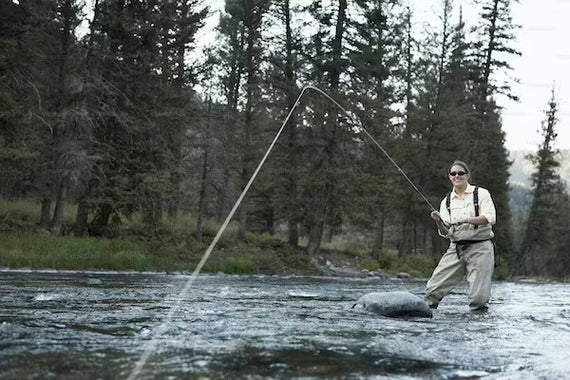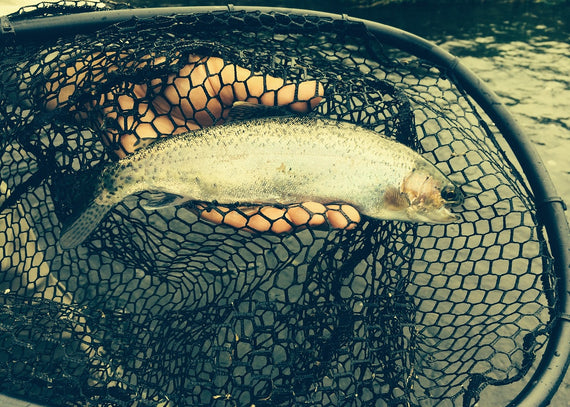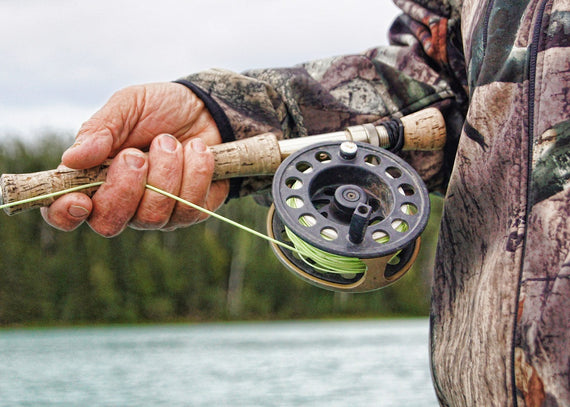Why the fight over access to public waters in Louisiana, and across the country, is fundamental to the future of hunting and fishing in America
The redfish cruised the edge of the reeds, unhurried and unalarmed. The U-shaped push of the big blunt head was coming straight toward our flats skiff. I was in the right place at the right time. Only one person could screw this up now.
I roll-cast the crab fly from the palm of my hand, backcast once, and lay the fly against the marsh bank. I wince—the pattern lands a little short.
“That’ll work,” says my guide, Michael Evans. “Leave it.”
The fish stays the course, 10 feet from the fly and closing. Play this right, I think, and this could be as perfect as it gets when it comes to casting for Louisiana redfish.
“Now,” Evans commands.
I strip-set the fly, and line rips from the reel as the redfish bolts across the shallows. I whoop as the fish surges three times before Evans hauls it overboard, and all is as it should be—green marsh, blue sky, and a redfish in hand. It is a gorgeous morning in one of the most iconic sporting landscapes in America. But the worry is, it could all be falling apart in south Louisiana.
I was so focused on the fish that I initially missed a few significant details: The marsh edge here is corroded and eroding, with chunks of black muck and reeds calving into the open water. Dotting the shoreline are posted signs, and I can see that the only other boat out here is working over ponds deep in the marsh interior. Those anglers are most likely trespassing, although they don’t know that—or do and don’t care.
It’s a scene that captures precisely why the self-proclaimed “Sportsman’s Paradise of Louisiana” is in the middle of the largest—and possibly most impactful—public-waters dispute in the country. Increasing numbers of private landowners are posting bayous, marsh ponds, and canals that have been used by the public for decades. Altercations between landowners and hunters and anglers are on the rise. Guides complain of losing access to vast sweeps of marsh and water. And the issue of who owns the water—and who can access it—is spilling over into parts of Louisiana far from the coast. This past summer, a dock owner at Lake D’Arbonne was arrested for pouring gas on three anglers who were legally fishing from a boat near his property. At Lake Catahoula, one of the most storied waterfowling destinations in the country, a U.S. District Court last year ruled that the body of water was a river, not a lake, and could not be managed as a public resource as in the past. The state has appealed the ruling, and it awaits a decision by the Third Circuit appeals court.
Across the country, access to public waters is under siege, at a scale similar to the threats public lands have faced over the last few years. Court cases and legislative efforts are underway to change legal precedents and long-standing traditions concerning public-waters access. River by lake by creek by marsh, one stream at a time or through regulatory changes that could wipe away the public’s access across entire landscapes, outdoorsmen are increasingly being gated out of and litigated off some of the country’s most iconic waterways. It’s an issue that affects freshwater and saltwater anglers alike, plus duck hunters, river paddlers, and anyone else whose outdoor passions require access to water. And it’s an issue that could fundamentally alter opportunities for generations of hunters and anglers.
"Anglers and hunters stand to lose sporting opportunities. So they better stand up and make their voices heard."
In Colorado, a lawsuit has been filed by a trout angler who was run off the Arkansas River, which he accessed from public land. In New Mexico, the attorney general’s office issued an opinion that all the state’s fishing streams are in the public domain, setting up potential court and regulatory fights. In North Carolina, the rights of the public to access the dry-sand beach went all the way to the state supreme court before being upheld in a dismissal. Issues of privatizing lakes are popping up in Minnesota and Wisconsin, and across New England, public waters where fisheries have been managed and enhanced with public funds are being increasingly gated off to the public. The message is loud and clear: Anglers and hunters stand to lose sporting opportunities. So they better stand up and make their voices heard.
Marsh Madness
For the most part, Louisiana’s legendary hunting and fishing rests squarely on access to public waters, so it’s no surprise that the largest fight for access to public waters is underway there. Louisiana’s water-access laws are a murky stew based on a rare legal system with roots in the Napoleonic era. It’s the only state that allows for private ownership of water bottoms below tidal waters, and it’s these marshes in south Louisiana that are being increasingly posted—and contested.
In a convoluted, multichambered nutshell, this is the issue in the Pelican State: Louisiana is losing marsh along the Gulf Coast like a snake sloughing its skin. The land is sinking, the seas are rising, and the marshes are tattered and torn from pipeline and navigation canals. The figures are so staggering and so well-known that they could practically pass for the state motto: Louisiana loses enough marsh to cover a football field every 100 minutes. Two thousand square miles have vanished in the last 100 years, and some experts say that another 2,000 squares miles might still dissolve away.

Much of the south Louisiana marsh is privately owned by individuals and families, but also by oil and gas companies, and often in huge chunks measured by the thousands of acres. While tidal waters in other states are typically open to public access, Louisiana allows private landowners to own tidal waters as long as the water was not claimed by the state when Louisiana was created in 1812. But in many areas, no one is entirely sure who owns what. The ownership issues are so complex in many areas that vast sweeps of open water are designated as “dual claimed lands,” claimed by both the state and private landowners.
Some of Louisiana’s challenges with public-waters access are similar to those in other regions around the country. Like 21 other states, Louisiana doesn’t require private landowners to post lands against trespass, putting the onus on sportsmen to know the lines. That’s a huge issue in a world of marsh and water, especially when shorelines change so rapidly. And like many states, access to a waterway is based on navigability: Streams, rivers, or marsh channels that are navigable for commerce are typically considered open to the public. But Louisiana’s law adds a qualifier: It reads “naturally navigable.” No one seems to know what that means.
The complications pile up. If private landowners lose control of water bottoms that used to be marsh, they also give up the potential value of oil or gas deposits, which could be collectively measured in the billions of dollars. As privately owned marsh erodes into open, navigable water, a public used to going wherever a boat can float is increasingly at odds with private landowners asserting more control over properties that were long accessed by anglers, hunters, and guides. More and more public funds are being used to restore marshes on private lands, and many observers feel there should be some mechanism to allow the public access to the restored marsh it paid for. Private landowners disagree. It’s all leading to hot tempers and a rush of posting on marsh and water where generations of Louisianans have hunted and fished.
In South Louisiana…sportsmen are being harassed, landowners are being vilified, and the state’s hunting and fishing economies are at risk.
Right now, the situation in south Louisiana, a place on nearly every sportsman’s bucket list of places to visit, is a quagmire of conflicting opinions. Sportsmen are being harassed, landowners are being vilified, and the state’s hunting and fishing economies—saltwater fishing alone supports 7,700 jobs and pumps $50 million a year into the state economy—are at risk. Last year, Louisiana Rep. Kevin Pearson introduced House Bill 391, which would have opened most tidal waters to public access regardless of ownership. The effort ultimately failed, but the intensity of the debate and the public outcry on all sides of the issue led most observers to believe that the time is ripe for potential solutions.
“I believe compromise that works for all these parties is realistic in south Louisiana, and I think we have the political environment to achieve it,” says Josh Kaywood, the Southeast regional coordinator for Backcountry Hunters & Anglers. “Louisiana’s coast is a petri dish right now. Practically every conservation organization on the planet is down there studying coastal marsh loss and struggling with property-rights issues. A lot of states are watching what happens in Louisiana, even with its specific legal systems and issues.”

Home Waters
Randy Moertle cuts the outboard motor, and we drift along the edge of a sprawling marsh-ringed lake. Puffy clouds overhead are mirrored in hundreds of acres of open water. On a spit of high land sits a simple, metal-roofed camp. There’s a pirogue, a johnboat, and a four-wheeler under a shed. Those are the only structures in sight.
To any angler or hunter, this place looks like a piece of heaven. Moertle manages 18,000 acres of marsh, open water, and high ground for Clovelly Farms, a large agricultural enterprise in Lafourche Parish—the ball of the foot in Louisiana’s boot-shaped profile. Clovelly Farms runs leases for crabbing, sugarcane, cattle, alligator hunting, alligator-egg collecting, commercial catfishing, oystering, a boat launch, and numerous private fishing and hunting camps. This particular leaseholder, Moertle tells me, pays $400 a year for the cabin and $4 an acre for the marsh and open water for hunting and fishing. It’s not a wealthy fat cat’s retreat, Moertle says. These are welders, shrimpers, and university professors. Most of his lessees pay less than $1,500 a year for their camps, which are often handed down from one generation to the next. “This is part of Louisiana’s culture,” he says. “I could lease the entire 18,000 acres to a corporation and walk away from all the paperwork. But these camps are like family. You take this from the people, and they would die inside.”
Aside from their property-rights concerns, landowners and property managers like Moertle fear that a widespread opening of coastal Louisiana’s private waters to the public—which is advocated by many in the sporting community—would wreak havoc on private property where enormous sums of money have been spent on private and private-public marsh restoration and mitigation projects. If private waters were opened to the public, issues of trespass on adjacent marshes would skyrocket, they say, and marsh would be increasingly degraded by overuse. “And the oil and gas industries are shaking in their boots over liability issues if they have to open their pipeline canals to the public,” Moertle says.
As Moertle sees it, social media has empowered and emboldened a relatively small number of private citizens—charter captains, mostly—to organize a near-takeover of private property. “The problem is that some people want to be able to go everywhere, all the time,” he says. “But nobody is going to give up their property rights.”

Moertle runs the boat down a picket fence of white PVC pipe that the leaseholder put in to mark a single channel through the pond to minimize his boat’s impact on the marsh bottom. I look around at marsh without a piece of trash, with a minimal human footprint, windswept and wild. Who wouldn’t want a spot like this? Louisiana is such a thorny mess because, in large measure, all sides present compelling arguments. No one wants to go to court: The state can’t afford to litigate the issue parcel by parcel, and private landowners aren’t eager to take a chance that they will lose billions. But who wants the current situation either, rife with resentment and threats of violence and utter confusion on the public’s part about where it’s legal to wet a line in south Louisiana?
I spent the next day in one of the frequently cited hotspots of the public-waters fight—Grand Isle, a barrier island and marsh complex—with Daryl Carpenter, a charter captain and board member of the Louisiana Sportsmen’s Coalition. The group advocates for public-waters access, and Carpenter had no trouble pointing out posted signs, gated canals, and tidal creeks barricaded with floating barrels and chains.
But it wasn’t until the end of the day that the stakes were made clear. Carpenter pulled out his cellphone. “Looka here,” he said, showing me a photo of three little girls from Baton Rouge who he’d had on the boat the day before. They landed redfish and trout, giggling with each catch, and then the youngest, a 4-year-old, hooked into a ladyfish. “That’s the poor man’s tarpon,” Carpenter said. “The fish went to jumping and running, and I promise you everybody within 2 miles heard that little girl squealing: ‘I got him! I got him! He’s jumping, but I got him!’”
He puts his phone down and looks off toward the water, his lower lip trembling. Carpenter can be a gruff man. He courts controversy. But like so many in Louisiana, the notion of losing access to places where a ladyfish can light up the day touches a deep place. “Those little girls are what this fight is about,” he says. “If we don’t figure this out…” His voice trails off as he presses his hands one into the other, forearms tensing to check his emotion.

Balancing Act
The alliance between the Gulf Coast’s wild coastline, agriculture, oil and gas industry, and the fishing and hunting communities has never been an easy one, but if Louisiana finds a path forward, it could become a model for other states. “If we can turn the heat down in Louisiana, cooler heads can navigate these issues with a scalpel and not an ax,” says S. Beaux Jones, a Louisiana private-practice attorney who served as the environmental section chief for the state’s Department of Justice. The solution to public-waters-access conflicts in Louisiana and across the country needs to approach what some water-rights experts have called the “Goldilocks ratio,” a just-right balance of public access and protection of private-property rights. It’s easy to talk about but has proven elusive to strike so far.
That’s why what is happening on the Louisiana coast is related to courtrooms in Colorado, streamsides in Utah, and brook trout ponds in Maine. America is at a fever pitch grappling with public rights to land and water, fish and wildlife, because the future of fishing and hunting lies in the balance. But this national conversation over public-waters access can lead to concrete gains for anglers and hunters.
“We’ve grappled before with how to balance development and conservation and protectionism,” Jones tells me. “In the past, we had the likes of Teddy Roosevelt, Aldo Leopold, Gifford Pinchot, and John Muir to guide our thinking as we formed policies around these pillars of American conservation and access. Now we’re faced with re-examining our core beliefs about a world humans have altered so much. I’m heartened because I’m starting to see the courage to ask the tough questions.”
The answers will only come from a new era of Roosevelts and Leopolds who can lead sportsmen and -women to think critically about public interests and private rights, and ensure that their voices are heard. The water wars are raging, and for anglers, duck hunters, birdwatchers, and boaters, there is enormous ground at stake.
Points of Access
From anchoring to wading to camping on a riverbed, here’s a look at how your access to public waters could be limited.

Navigability
In general, the U.S. Supreme Court has held that waterways are considered “navigable” if they were used or were able to be used for commerce at the time a state entered the Union. Commerce isn’t restricted to typical boating and shipping, but could also be logging, trapping, or even trade with native tribes. Navigable waters are open to public use, but some states are more restrictive than others.
Overland Access
Can you drop a canoe (1) into navigable waters at a bridge crossing? Depends on where you live. States like California and Montana have established legal access along some state roads and bridges, but check laws first.
Stream Bottoms
In states such as Wyoming, Colorado, Utah, and New Mexico, private ownership of the streambed means fishermen and boaters cannot touch the bottom of the river, stream, or creek—not with a wading boot, paddle or oar, or an anchor (2). And theoretically, not even with a crankbait or weighted nymph rig.
Ordinary High-Water Mark
Some states allow public access to private lands between the ordinary high-water mark and the water’s edge (3). The ordinary high-water mark is the line the water makes by covering land for enough time to create physical characteristics that distinguish it from the land above the line. It doesn’t include floodplains. In those states, you can walk, wade (4), and even camp—most commonly on sandbars, gravel beaches, and some islands—below the ordinary high-water mark.
Portaging
Some states express a “right to portage” that allows boaters to access private lands adjacent to public waters when scouting river hazards (5) or pulling equipment around river hazards as long as the most direct route closest to the water course is followed. But some states don’t.
The States of Access
Efforts to privatize waters are on the rise around the U.S. Here are nine states where fights have been won, battles lost, and where skirmishes continue in the effort to maintain access to America’s sporting traditions.
Arizona
The Arizona Navigable Stream Adjudication Commission (ANSAC) has determined that the Colorado River is the only navigable river on which the public can float through private land without the landowner’s permission. Decisions from ANSAC have determined that the Gila, Upper Salt, and Verde rivers are all nonnavigable, and more determinations are forthcoming.
Colorado
You can be cited for trespassing in Colorado if you float over a streambed adjacent to private property, because the state has never declared what constitutes a navigable stream. A court case is currently underway between an angler and a landowner on the Arkansas River, but the state of Colorado has moved to dismiss the case, citing it doesn’t have standing.
Florida
A state law, effective July 1, 2018, has barred the public from the dry-sand beach above the high-tide line in certain counties, setting up a public-waters-access fight. The law held that any county that had on the books by January 2016 a “customary use law” allowing pubic access to the beach could keep it, but elsewhere private landowners could close the beaches. The law is widely viewed as targeting the Panhandle’s Walton County, particularly, where 4 million tourists a year aren’t appreciated by wealthy beachfront landowners.
Maine
Here, a colonial-era law guarantees public ownership and access to the state’s 2,600 “great ponds”—any freshwater lake larger than 10 acres—as long as you walk in over “unimproved land.” But increasing lakeshore development is shutting out more and more anglers as the lands around the lakes are being snapped up by private buyers.
Montana
Upheld by the state supreme court in 1984, Montana’s Stream Access Law is considered the pinnacle of public-waters-access rules: It allows the public to wade any navigable streambed and walk on the adjacent shore of private land as long as they stay below the ordinary high-water mark.
New Mexico
Anglers in New Mexico applauded in 2014 when the state attorney general issued an opinion that all state fishing streams are public-domain waters and open to fishing and walking, even when flowing through private property. But that was an opinion, not a law. And in the closing days of 2017, the New Mexico Game and Fish Commission adopted a rule that allows private landowners to apply for certification that their streams are nonnavigable and off-limits to the public.
North Carolina
In December 2016, the state supreme court let stand an appeal of a lower ruling that upheld the public’s use of the state’s beaches between the high-tide line and front edge of the dunes. A New Jersey couple had sued the town of Emerald Isle in a case that could have created a domino effect of beachfront owners barring access to surf anglers, surfers, and beachcombers.
South Dakota
In an unusual twist, South Dakota is struggling with how to manage surface waters that have appeared only over the last few decades. Increased rainfall in the 1990s created “nonmeandered lakes” in the northeast part of the state as low basins filled with water. Many of these developed prize perch and walleye fisheries due to stocking by the state and were long accessed by the public. But a law passed in a 2017 special legislative session allows landowners to petition the state to close nonmeandered lakes on their private property, resulting in a lockout of anglers who helped pay for the fish and improved water access in the first place.
Utah
The Utah Stream Access Coalition has sued to challenge a law that makes it illegal for the public to touch the bottom of privately held streams and would eliminate wading access to more than 2,700 miles—43 percent—of state waters. Another court case is being tried that could formally recognize which streams and rivers are designated as “navigable” and therefore open to public access.
Written by T. Edward Nickens for Field & Stream and legally licensed through the Matcha publisher network. Please direct all licensing questions to legal@getmatcha.com.



 loading="lazy"
loading="lazy"
 loading="lazy"
loading="lazy"
 loading="lazy"
loading="lazy"